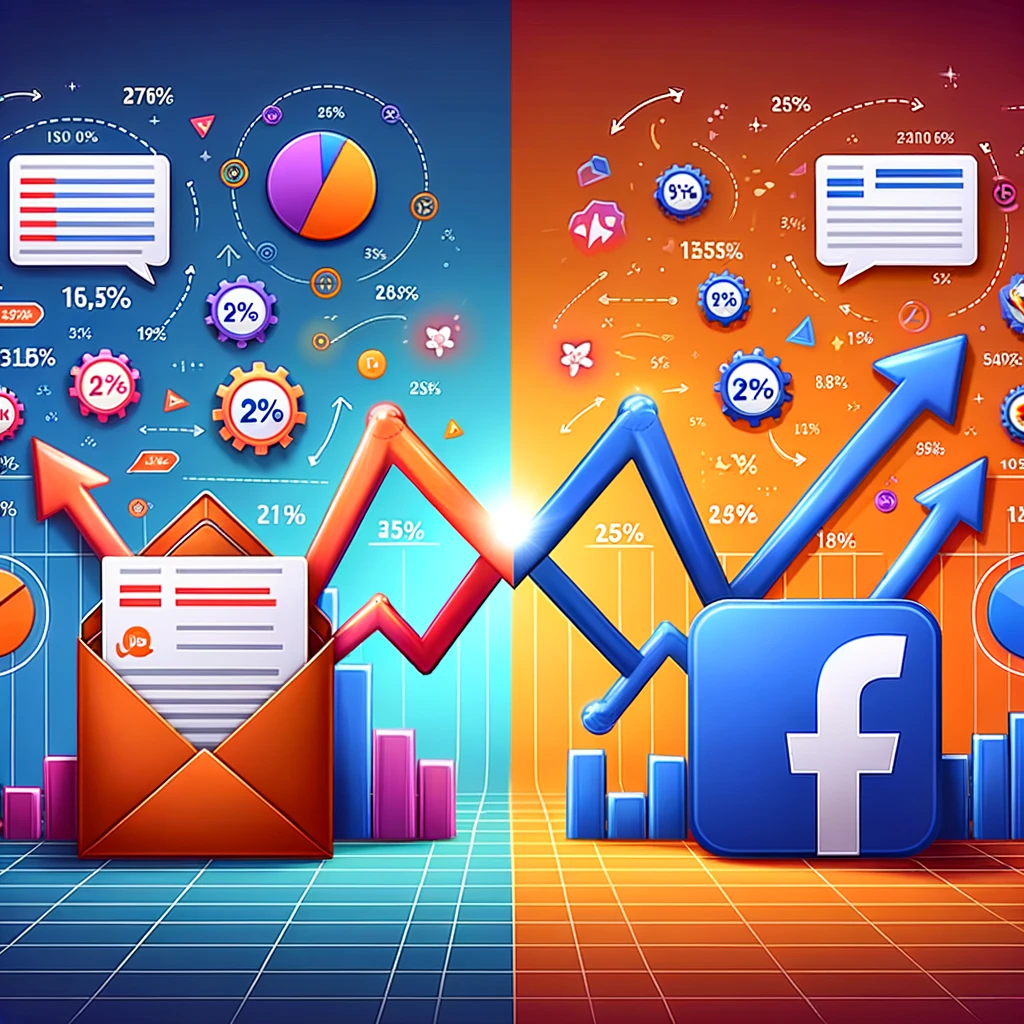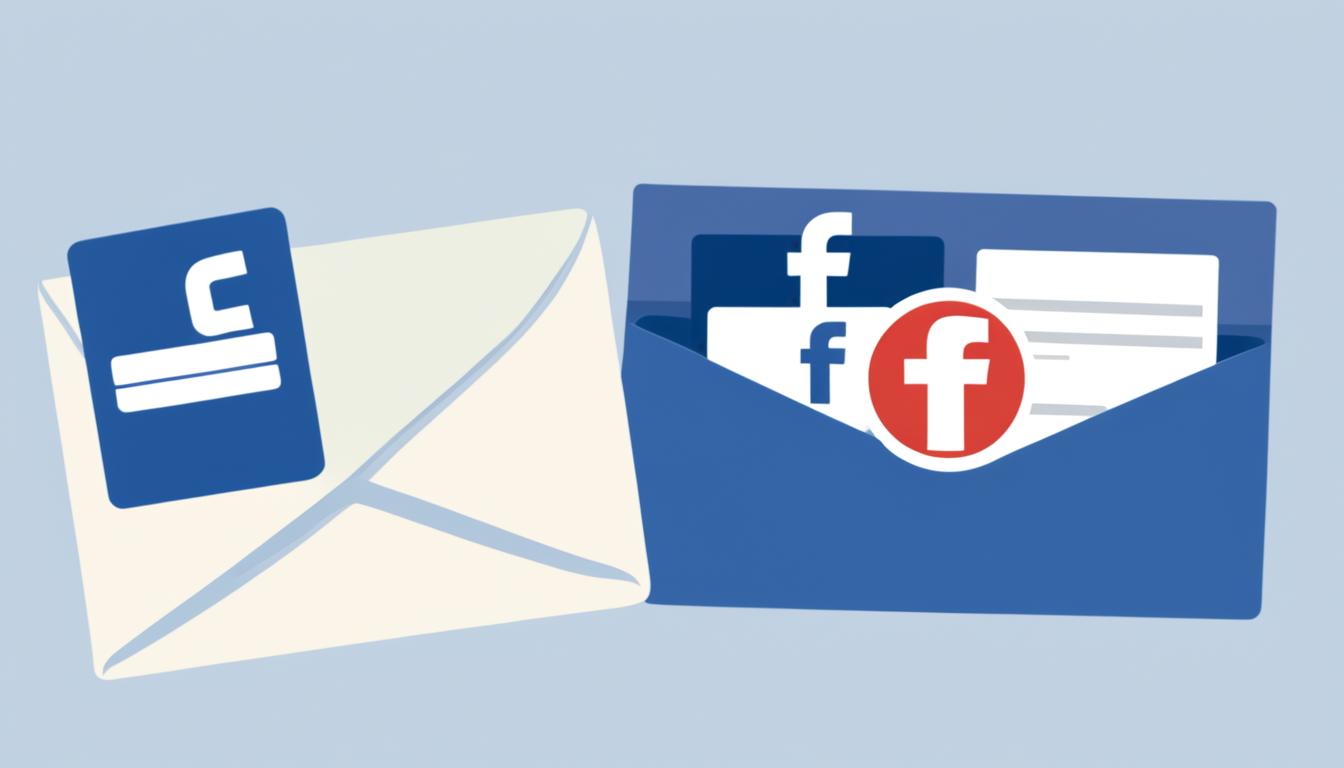Did you know that email marketing and Facebook ads are considered to be some of the most effective digital marketing strategies worldwide? These marketing channels have the potential to boost businesses and drive profits in significant ways. The question remains: when it comes to email marketing vs Facebook ads, which is more effective?
To help you make an informed decision, we will compare the data and statistics from various sources to uncover the strengths and weaknesses of each channel. Whether you’re running an email campaign or investing in social media advertising, understanding the differences between these marketing giants is crucial for success in the digital world.
Key Takeaways:
- Email marketing and Facebook ads are powerful tools in digital marketing.
- Comparing the data and statistics can help determine which channel is more effective.
- Understanding the strengths and weaknesses of each channel is crucial for success.
- Both email marketing and Facebook ads have their own unique benefits and uses.
- A combination of both channels can create a powerful marketing strategy.
Current Users
When it comes to comparing the reach of email marketing and Facebook ads, it’s essential to consider the user base of each platform. As of recent data, Facebook boasts approximately 2.23 billion active monthly users across the globe. While this figure is undoubtedly impressive, the number of email users eclipses this, standing at a staggering 3.8 billion users.
Facebook’s growth has been extraordinary, but email has been a staple communication tool for a longer period, leading to a larger user base. Let’s delve deeper into these numbers to understand the significance.
Daily Usage
In the world of digital communication, both Facebook and email hold significant sway. Let’s dive into their daily usage and explore why email campaigns remain a powerful tool for businesses.
Facebook reigns as a bustling hub of activity, with users generating 422 million status updates, sending 216 million messages, and sharing 72 million links every single day. The platform’s social nature fosters interaction, engagement, and social sharing, making it an ideal space for brands to reach a wide audience.

However, when it comes to sheer usage, email outshines Facebook. A staggering 281 billion emails are sent daily, representing an enormous opportunity for businesses to connect with their customers. With well-crafted email campaigns, companies can deliver targeted messages directly to their audience’s inboxes, fostering meaningful engagements and driving conversions.
| Activity | 422 million status updates | 281 billion emails |
| Messaging | 216 million messages | |
| Sharing | 72 million links |
Email’s wide usage demonstrates its effectiveness as a marketing channel. By crafting compelling content and delivering it directly to users’ personal inboxes, businesses have a greater chance of capturing attention, driving engagement, and generating valuable leads.
Reach
When it comes to reaching your audience, both Facebook and email have their strengths and weaknesses. Let’s take a closer look at the reach of these two marketing channels.
Facebook Reach:
Facebook’s organic reach has seen a significant decline over the years. In 2012, organic reach was at an average of 16%, while in 2018, it dropped to as low as 2%. This decrease in organic reach means that posts on Facebook pages are only reaching a small fraction of their fans.
Email Reach:
Email reach, on the other hand, is influenced by deliverability rates. In 2018, the global average delivery rate for emails was approximately 85%. This means that if you send an email campaign to a list of 50,000 subscribers, you can expect it to reach around 42,500 inboxes. Compared to the limited reach of Facebook posts, email offers a higher chance of reaching a larger portion of your audience.
Knowing the reach capabilities of both Facebook and email can help you make informed decisions when planning your marketing campaigns. While Facebook may have a larger user base, it’s important to consider the declining organic reach. Email, on the other hand, offers a higher chance of reaching your subscribers’ inboxes, allowing for more direct and targeted communication.

Click-Through-Rate (CTR)
When it comes to measuring the success of marketing campaigns, click-through rates (CTR) play a crucial role. It indicates how effective an ad or email is in driving engagement and generating clicks. Let’s compare the CTR of Facebook ads and email marketing to understand their performance.
Facebook CTR
On average, Facebook ads achieve a CTR of 0.90%. This means that for every 1000 views, the ad receives approximately 9 clicks. While Facebook provides significant reach and visibility, the CTR is relatively low compared to other marketing channels.
Email CTR
However, when it comes to email marketing, the CTR tells a different story. Email enjoys an average CTR of approximately 5.86%, which is significantly higher than that of Facebook ads. This means that for every 1000 email opens, around 59 recipients click on a link within the email. The higher CTR indicates that email marketing is more effective at driving engagement and generating clicks.
“Email marketing enjoys an average CTR of approximately 5.86%, which is much higher than that of Facebook ads.
So, why does email marketing outperform Facebook ads in terms of CTR? One reason is that emails are often sent to a targeted audience who has already shown interest in the brand or opted to receive updates. This creates a higher likelihood of engagement and click-through. Additionally, emails can be personalized and tailored to the recipient’s preferences, making them more relevant and enticing.

Furthermore, email campaigns can be optimized using A/B testing, catchy subject lines, compelling content, and clear call-to-action buttons, all of which contribute to a higher CTR. Marketers can track the performance of their emails using metrics like open rates and click-through rates, allowing them to refine their campaigns and deliver more engaging content to their audience.
In conclusion, email marketing surpasses Facebook ads when it comes to CTR, indicating its effectiveness in driving engagement and generating clicks for marketing campaigns.
Purchases
While many people associate email with spammy sales messages, it is actually a highly effective driver of purchases. Studies show that 66% of consumers have made a purchase as a result of email marketing, compared to 20% who made a purchase after seeing a Facebook ad. This highlights the power of email in generating conversions and driving sales.
The personalized nature of email allows businesses to target specific audiences with tailored offers and promotions, resulting in higher engagement and ultimately, more sales. With effective email marketing strategies in place, companies can build a strong relationship with their subscribers, nurturing them from prospects to loyal customers.
We’ve seen great success with our email campaigns. By providing valuable content and exclusive discounts to our subscribers, we’ve been able to drive conversions and boost our sales numbers. Email marketing has become an integral part of our overall marketing strategy.
On the other hand, while Facebook ads can reach a vast audience, it can be more challenging to convert users into customers. Facebook is often utilized by businesses to build brand awareness and engage with their target market. While it can be effective at driving traffic and raising interest, the conversion rates may not be as high as with email marketing.
By combining the power of both Facebook marketing and email marketing, businesses can create a comprehensive marketing strategy that covers various stages of the customer lifecycle. Facebook ads can help create initial awareness and engagement, while email marketing can drive the actual conversions and sales.

Email Marketing Conversions
| Email Marketing | Facebook Marketing |
|---|---|
| 66% of consumers make a purchase | 20% of consumers make a purchase |
| Personalized offers and promotions | Broad reach and brand awareness |
| Loyal customer base | Engagement and lead generation |
In the next section, we will discuss the importance of regulation and control in both Facebook marketing and email marketing.
Regulation and Control
When it comes to managing and controlling your marketing efforts, the policies and regulations surrounding Facebook ads and email marketing differ significantly.
With Facebook ads, marketers are required to comply with the platform’s policies and guidelines. These policies dictate what types of content can be promoted, the use of targeted advertising, and other factors that impact the reach and visibility of your ads. Additionally, Facebook’s algorithm changes can have a significant impact on the organic reach of your content, making it challenging to maintain consistent visibility.
On the other hand, email marketing provides marketers with greater control over their messaging and subscriber data. Marketers can adhere to email regulations related to obtaining proper consent from subscribers and providing clear options to unsubscribe. This level of control not only ensures compliance with email marketing laws, but also contributes to building trust with your customers.
Data Control and Privacy
“Email marketing gives us the power to control our messages and manage subscriber data, ensuring compliance and building trust.”
When it comes to subscriber data, email marketing allows marketers to maintain ownership and control over their contact lists. This means that you have the final say in how subscriber data is collected, stored, and utilized. With proper data management practices, you can leverage subscriber data to personalize your messaging and create targeted email campaigns.
In contrast, when running Facebook ads, you have limited access to user data. While Facebook provides targeting options based on user demographics and interests, the platform controls access to this data. Marketers do not have direct ownership or control over user data, which can limit the extent to which you can personalize and target your ad campaigns.
Overall, having control over your messaging and subscriber data is a significant advantage of email marketing. It allows you to maintain compliance with regulations, build trust with your audience, and create targeted campaigns tailored to individual subscribers.

| Facebook Ads | Email Marketing | |
|---|---|---|
| Control over messaging | Limited | Full |
| Subscriber data ownership | Platform-owned | Marketer-owned |
| Compliance with regulations | Platform-dependent | Marketer-controlled |
Relationship Building
When it comes to relationship building, email marketing takes the lead. With email, we have the ability to establish direct and personalized communication with our audience. This allows us to deliver valuable content, special offers, and important updates directly to their inbox. The personal touch of email marketing fosters a sense of trust and connection, making it an ideal channel for building and nurturing long-term relationships with our audience.
On the other hand, Facebook ads are better suited for creating brand awareness and generating leads. With its extensive reach and targeting capabilities, Facebook allows us to create highly visible ad campaigns that can captivate a large audience and attract potential customers. Facebook ads are effective in increasing brand recognition and engagement, helping us build a solid foundation from which to establish deeper relationships.
“Email marketing allows for direct and personalized communication, fostering trust and connection with our audience.”
By incorporating both email marketing and Facebook ads into our marketing strategy, we can effectively combine the strengths of each channel. First, we can use Facebook ads to create brand awareness and attract new leads. Then, we can follow up with email marketing to continue nurturing those leads and building stronger relationships. This integrated approach allows us to maximize brand exposure and engagement, leading to higher conversion rates and customer loyalty.
The Power of Personalization
One of the key advantages of email marketing is the ability to personalize our communication. By segmenting our email list and tailoring our content to specific audience groups, we can deliver customized messages that resonate with individual recipients. This level of personalization helps us build a deeper connection with our audience, as they feel valued and understood.
On the other hand, Facebook ads provide an opportunity to reach a broader audience and create brand awareness. While individual personalization may not be as pronounced, Facebook ads can still be effective in generating engagement and capturing the attention of potential customers.
When it comes to relationship building, the combination of personalized email marketing and broad brand awareness through Facebook ads can yield powerful results. By utilizing both channels strategically, we can create a comprehensive marketing approach that engages our audience at every stage of the customer journey.
| Email Marketing | Facebook Ads | |
|---|---|---|
| Relationship Building | Highly effective in building and nurturing long-term relationships through direct and personalized communication. | Effective in creating brand awareness and attracting leads, but may not have the same level of personalization. |
| Brand Awareness | May not have the same level of reach as Facebook ads, but can still generate brand recognition through targeted messaging. | Can reach a large audience and create broad brand awareness. |
| Lead Generation | Can capture leads through opt-in forms and lead magnets, nurturing them through personalized email campaigns. | Effective in attracting new leads through targeted ad campaigns and capturing their contact information. |
| Conversion Rates | Engaged email subscribers are more likely to convert into customers due to personalized communication. | Effective in driving immediate conversions through targeted ad campaigns and call-to-action buttons. |
Conversion and ROI
When it comes to driving conversions and measuring return on investment (ROI), both Facebook ads and email marketing play a crucial role in an effective marketing strategy. However, the conversion rates and ROI can vary between the two channels.
Email marketing often enjoys higher conversion rates due to its ability to reach a more engaged audience. With email, you have the opportunity to directly communicate with subscribers who have willingly opted in to receive your messages. This level of engagement can lead to higher conversion rates as your audience is already interested in what you have to offer.
On the other hand, Facebook ads can be effective at generating conversions by targeting new audiences and retargeting website visitors. With the vast amount of user data available on Facebook, you can create highly targeted ad campaigns to reach potential customers who may not be familiar with your brand or products. By strategically promoting specific products or offers, you can entice users to take action and convert.
To illustrate the differences in conversion rates and ROI, let’s look at the following data:
| Marketing Channel | Conversion Rate | ROI |
|---|---|---|
| Email Marketing | 8% | 4:1 |
| Facebook Ads | 3% | 2:1 |
Based on the above statistics, email marketing has a higher conversion rate of 8% compared to Facebook ads’ 3%. This means that for every 100 leads generated, email marketing is more likely to convert 8 of them into customers, while Facebook ads will convert only 3. Additionally, email marketing achieves a higher ROI of 4:1, indicating that for every $1 spent on email marketing, businesses can expect to earn $4 in return. In comparison, Facebook ads have an ROI of 2:1.
While email marketing may have the edge in terms of conversions and ROI, it’s important to note that both channels have their strengths and can complement each other in a comprehensive marketing strategy. By utilizing the strengths of each channel, businesses can maximize their marketing efforts and reach their target audience effectively.
Now that we’ve explored the differences in conversion rates and ROI, let’s delve into the unique capabilities of each channel in the next section.
Conclusion
In conclusion, when it comes to email marketing vs Facebook ads, it’s not about choosing one over the other. Rather, it’s about harnessing the unique strengths of each channel to create an optimal marketing strategy. Facebook ads are highly effective for raising awareness, driving engagement, and encouraging social sharing. On the other hand, email marketing shines in building strong relationships, driving conversions, generating leads, and retaining valuable customers.
By combining both strategies, businesses can create a powerful marketing approach that reaches and engages their target audience effectively. Facebook ads can help in creating brand awareness and attracting new leads, while email marketing can nurture these leads, build trust, and drive conversions. This synergy allows for a comprehensive and results-driven marketing campaign.
Ultimately, the optimal marketing channels depend on the specific goals and target audience of the business. It’s important to analyze the data, understand customer behavior, and develop a well-rounded marketing strategy that leverages the strengths of both email marketing and Facebook ads. By doing so, businesses can maximize their reach, increase engagement, and achieve long-term success in the digital marketing landscape.
FAQ
Is email marketing or Facebook ads more effective for boosting businesses?
Both email marketing and Facebook ads have their strengths and can be effective in different ways. It’s important to leverage the strengths of each channel to maximize marketing efforts.
How many active users does Facebook have compared to email users?
Facebook has about 2.23 billion active monthly users worldwide, while email has a massive 3.8 billion users.
How often do Facebook users engage with the platform?
Facebook users are highly active on the platform, with millions of status updates, messages, and shared links every day.
How does email usage compare to Facebook usage?
While Facebook usage is significant, with billions of active users, email outshines it in terms of overall usage, with approximately 281 billion emails sent per day.
What is the reach of Facebook compared to email?
Facebook’s organic reach has significantly declined, while email reach is influenced by deliverability with a global average delivery rate of approximately 85%.
Which channel has higher click-through rates (CTR), Facebook ads or email marketing?
On average, email marketing enjoys a higher CTR of approximately 5.86%, while Facebook ads typically achieve a CTR of 0.90%.
which channel is more effective at generating purchases, Facebook ads, or email marketing?
Studies show that 66% of consumers have made a purchase as a result of email marketing, compared to 20% who made a purchase after seeing a Facebook ad.
What level of control do marketers have with Facebook ads compared to email marketing?
Marketers have more control over messaging and subscriber data with email marketing, while Facebook ads have to comply with platform terms and policies.
which channel is better for building relationships with the audience?
Email marketing excels in building and nurturing relationships over time, allowing for personalized and direct communication. Facebook ads are better suited for creating brand awareness and engagement.
Which channel has higher conversion rates and return on investment (ROI)?
Email marketing often has higher conversion rates as it reaches a more engaged audience, while Facebook ads can be effective at generating conversions by targeting new audiences or retargeting website visitors.









